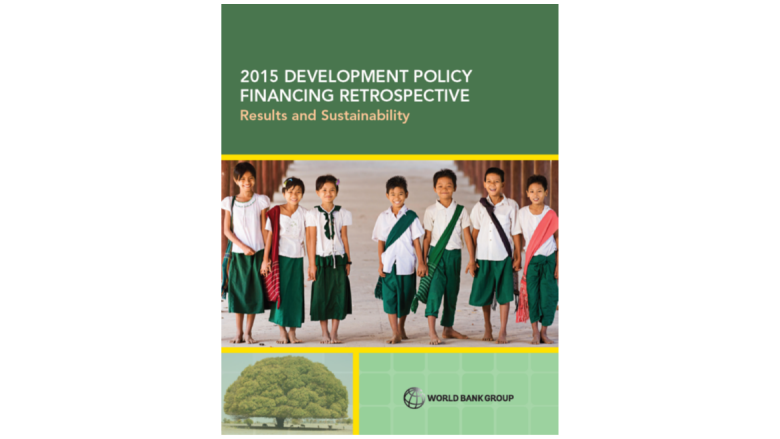Investment Project Financing (IPF)
is used in all sectors, with a concentration in the infrastructure, human development, agriculture, and public administration sectors. IPF is focused on the long-term (5 to 10 year horizon) and supports a wide range of activities including capital-intensive investments, agricultural development, service delivery, credit and grant delivery [including micro-credit], community-based development, and institution building.
Unlike commercial lending, Bank IPF not only supplies borrowing countries with needed financing but also serves as a vehicle for sustained, global knowledge transfer and technical assistance. This includes support to analytical and design work in the conceptual stages of project preparation, technical support and expertise (including in the areas of project management and fiduciary and safeguards activities) during implementation, and institution building throughout the project.
2013 - clarified processes, added more flexibility for borrowers, strengthened effectiveness and developmental impact. See Briefing on Changes
2017 – Multiphase Programmatic Approach is developed and approved for use.
IPF Resources
provides rapidly-disbursing financing to help a borrower address actual or anticipated development financing requirements. DPF aims to support the borrower in achieving sustainable development through a program of policy and institutional actions, for example, strengthening public financial management, improving the investment climate, addressing bottlenecks to improve service delivery, and diversifying the economy. DPF supports such reforms through non-earmarked general budget financing that is subject to the borrower's own implementation processes and systems. The Bank's use of DPF in a country is determined in the context of the Country Partnership Framework (CPF).
The DPF policy emphasizes country ownership and alignment, stakeholder consultation, donor coordination, and results, and requires a systematic treatment of fiduciary risks and of the potential environmental and distributional consequences of supported policies. DPF can be extended as loans, credits, or grants. Funds are made available to the client based on:
Development Policy Operations: Prior Actions
Prior Actions are policy and institutional actions deemed critical to achieving the objectives of a program supported by the development policy operation. These present the legal terms defined in the loan agreement that have to be met for each operation before disbursement. A database of prior actions for all development policy operations since fiscal year 2005 is updated annually at the end of each fiscal year by the Operations Policy and Country Services Vice Presidency.
Reviews of Development Policy Lending Use

2015 – the review focused on how reforms supported by Development Policy Financing (DPF) contributed to equitable growth and poverty reduction, taking into account environmental, social and economic sustainability.
DPF Resources
Multiphase Programmatic Approach (MPA)
allows countries to structure a long, large, or complex engagement as a set of smaller linked operations (or phases), under one program. As a result of breaking down a single loan into phases, Bank clients can match borrowing more closely with financing needs, permitting more efficient use of financial resources for both the Bank and clients. This “adaptive approach” also strengthens the potential for crowding in other sources of capital to support development objectives.
Subsequent phases of MPA programs will be prepared as separate operations with rigorous adherence to all applicable World Bank policies with regard to management reviews, fiduciary assessments, environmental and social safeguards assessments, and timely public disclosures and consultation with affected people.
This approach also encourages more learning and adaptation, as subsequent phases will be informed by lessons learned in previous ones. This will help ensure operations are more responsive to changing country circumstances.
MPA Resources
Technical Assistance - The World Bank Group can provide professional technical advice that supports legal, policy, management, governance and other reforms needed for a country's development goals. Our wide-ranging knowledge and skills are used to help countries build accountable, efficient public sector institutions to sustain development in ways that will benefit their citizens over the long term. Bank staff offer advice and support governments in the preparation of documents, such as draft legislation, institutional development plans, country-level strategies, and implementation action plans. We can also assist governments to shape or put new policies and programs in place.
Reimbursable Advisory Services (RAS) - Through RAS, the Bank can provide clients access to customized technical assistance on a reimbursable basis, either as a stand-alone or to complement an existing program. This allows us to provide advisory services that the client demands, but that the Bank cannot fund in full within the existing budget envelope. RAS programs have been used in more than 70 countries since the 1970s. World Bank member countries of all income levels can access RAS. Clients can be countries and government entities, but also states and municipalities, state-owned enterprises, civil society organizations, and multilateral agencies. RAS brochure with project examples
Economic and Sector Work - In collaboration with country clients and development partners, Bank country staff gather and evaluate information (data, policies and statistics) about the existing economy, government institutions or social services systems. This data provides a starting point for policy and strategic discussions with borrowers and helps enhance a country's capacity and knowledge. Studies and analytical reports help us support clients to plan and implement effective development programs and projects.
Donor Aid Coordination - The World Bank Group acts on occasion as a coordinator for organized regular interaction among donors (governments, aid agencies, humanitarian groups, foundations, development banks). Activities range from simple information sharing and brainstorming, to co-financing a particular project, to joint strategic programming in a country or region. It also includes the preparation of donor coordination events such as consultative group meetings (joint meetings of partners) focused on a particular issue or country. Other partnership information.